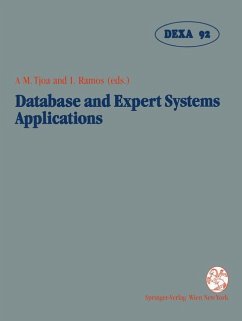
On Knowledge Base Management Systems
Integrating Artificial Intelligence and Database Technologies
Herausgegeben: Brodie, Michael L.; Mylopoulos, John

PAYBACK Punkte
20 °P sammeln!
Current experimental systems in industry, government, and the military take advantage of knowledge-based processing. For example, the Defense Advanced Research Projects Agency (DARPA), and the United States Geological Survey (USGS) are supporting the develop ment of information systems that contain diverse, vast, and growing repositories of data (e.g., vast databases storing geographic informa tion). These systems require powerful reasoning capabilities and pro cessing such as data processing, communications, and multidisciplinary of such systems will scientific analysis. The number and import...
Current experimental systems in industry, government, and the military take advantage of knowledge-based processing. For example, the Defense Advanced Research Projects Agency (DARPA), and the United States Geological Survey (USGS) are supporting the develop ment of information systems that contain diverse, vast, and growing repositories of data (e.g., vast databases storing geographic informa tion). These systems require powerful reasoning capabilities and pro cessing such as data processing, communications, and multidisciplinary of such systems will scientific analysis. The number and importance grow significantly in the near future. Many of these systems are severely limited by current knowledge base and database systems technology. Currently, knowledge-based system technology lacks the means to provide efficient and robust knowledge bases, while database system technology lacks knowledge representation and reasoning capabilities. The time has come to face the complex researchproblems that must be solved before we can design and implement real, large scale software systems that depend on knowledge-based processing. To date there has been little research directed at integrating knowledge base and database technologies. It is now imperative that such coordinated research be initiated and that it respond to the urgent need for a tech nology that will enable operational large-scale knowledge-based system applications.














